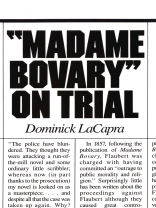In 1857, following the publication of Madame Bovary, Flaubert was charged with having committed an ‘outrage to public morality and religion.’ Dominick La Capra, an intellectual historian with wide-ranging literary interests, here examines this remarkable trial. La Capra draws on material from Flaubert’s correspondence, the work of literary critics, and Jean-Paul Sartre’s analysis of Flaubert. La Capra maintains that Madame Bovary is at the intersection of the traditional and the modern novel, simultaneously invoking conventional expectations and subverting them.
Despre autor
Dominick La Capra is Professor of History and Comparative Literature Emeritus at Cornell University. He is the author or editor of many books, including History and Its Limits: Human, Animal, Violence; History in Transit; and History and Memory after Auschwitz, all from Cornell.












